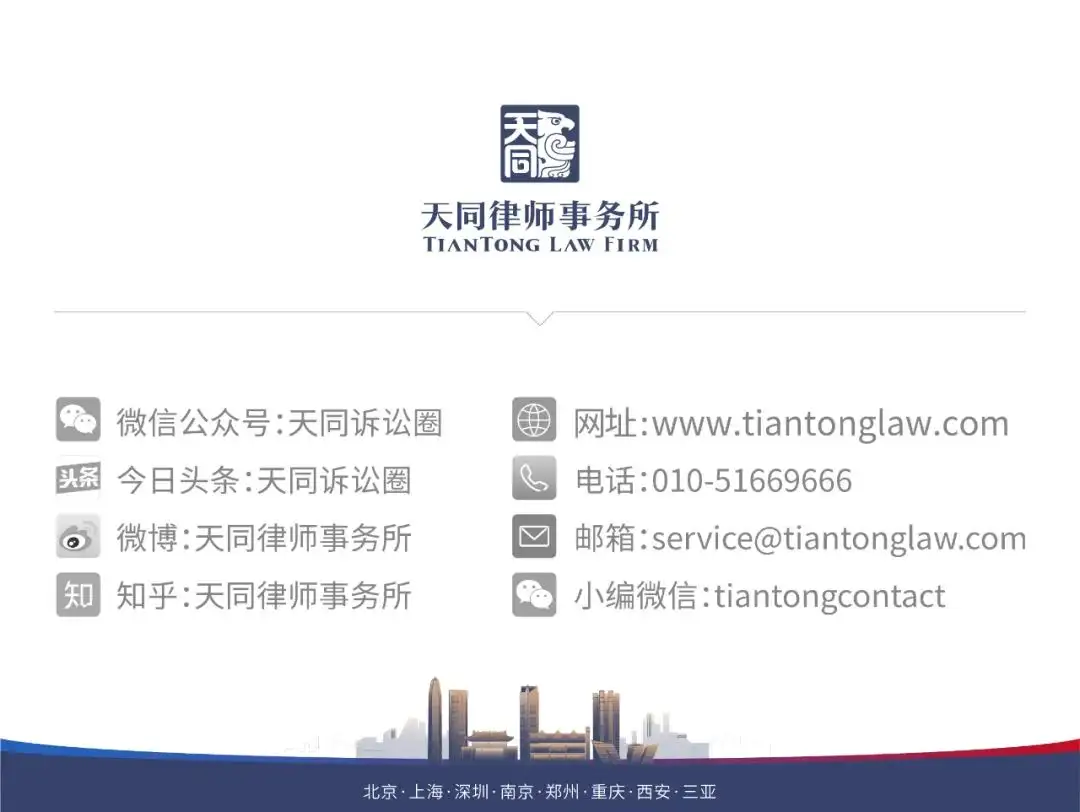
近日,受国际权威法律评级机构钱伯斯(Chambers & Partners)邀请,天同律师事务所朱华芳律师为其独家撰写钱伯斯《2023大中华区法律指南-争议解决:仲裁领域概览(中国篇)》(Chambers Greater China Region Guide 2023-Dispute Resolution: Arbitration (PRC Firms) Overview),参与撰写的还有合伙人吴颖律师和叶一丁律师。
下述为文章全文:
2023年中国仲裁概览
A Preview of the Arbitration in China
(2023)
仲裁是市场化法治化国际化营商环境的重要要素,仲裁司法审查的质效亦为法治化营商环境的“试金石”。应中国仲裁服务市场逐步开放,中国仲裁机构为提高自身竞争力锐意进取,持续深化制度改革,力争与国际商事仲裁实践接轨。为落实政府“提高仲裁公信力”要求、推动仲裁事业全面发展,中国司法部筹设了中国仲裁协会,中国法院也高度重视对仲裁的支持及司法监督工作,不断出台改革举措完善仲裁制度。回首2022年,中国仲裁事业在新冠肺炎疫情的肆虐下仍然稳步发展并取得可喜成绩;展望2023年,不断优化的仲裁服务以及日益完善的仲裁司法审查机制或将吸引越来越多的商事主体选择仲裁作为纠纷解决方式。
Arbitration is an indispensable part of an international, market-oriented, and law-based business environment, whilst the efficiency and quality of the judicial review of arbitration is a touchstone of such a business environment. In the context of the gradual opening up of China's arbitration market, Chinese arbitration institutions have continued deepening their reform and strived to keep pace with international commercial arbitration practices to improve their competitiveness. To implement the government's request of "improving the credibility of arbitration" and promoting arbitration, the Ministry of Justice of China led the establishment of the China Arbitration Association. Meanwhile, the courts have routinely attached great importance to supporting and streamlining judicial review of arbitration and continuously implemented reform measures to improve the arbitration system. In 2022, despite the negative impact of the COVID-19 pandemic, China's arbitration kept developing steadily and achieved encouraging results; in 2023, we preview that the continuous improvement in arbitration services and the court's judicial review of arbitration will attract more and more market participants to choose arbitration as the means for dispute resolution.
仲裁规则的修订与完善
Amendment and Improvement of Arbitration Rules
为解决新冠肺炎疫情期间现场开庭无法安排的问题,中国仲裁机构纷纷发布在线庭审指引、采取网上开庭方式;另随着科技进步,仲裁机构及当事人越来越倾向于采用更为便捷、高效的电子送达方式。基于前期实践经验,北京仲裁委员会、上海仲裁委员会、南京仲裁委员会等仲裁机构相继修订仲裁规则,正式明确开庭方式包括网上开庭,并对电子送达方式作出规定。
To cope with the negative impact on the in-person hearings caused by the COVID-19 pandemic, Chinese arbitration institutions have released online hearing guidelines and adopted online hearings. In addition, with the development of technology, arbitration institutions and parties have been more and more in favor of electronic service, which is more convenient and efficient. In this regard, a few arbitration institutions, including the Beijing Arbitration Commission, the Shanghai Arbitration Commission and the Nanjing Arbitration Commission, have amended their arbitration rules to specify online hearings as a method of hearing and the rules for electronic service.
为助力上海打造面向全球的亚太仲裁中心,上海仲裁委员会借鉴国际仲裁机构规则、吸收国内外最新理论实践成果,从维护仲裁公正性、促进仲裁高效性、发挥数字仲裁优势、提升仲裁国际化四个方面对仲裁规则作出修订及完善。新版《上海仲裁委员会仲裁规则》于2022年7月1日正式施行,除上述智慧仲裁内容外,其他重要修订包括:(1)将国际投资争议纳入受理范围;(2)开放《联合国国际贸易法委员会仲裁规则》对国际投资争议及其他类型案件的适用;(3)正式引入仲裁地概念;(4)明确仲裁协议准据法确定规则,允许当事人(不限于涉外争议案件当事人)约定仲裁协议适用的法律;(5)确立多份合同仲裁、合并仲裁、合并开庭、追加当事人制度;(6)赋予仲裁庭临时措施决定权;(7)允许当事人(不限制争议及当事人类型)在仲裁员名册之外选择仲裁员,并将“提名仲裁员名册外仲裁员申请表”作为附件,便利当事人提名及仲裁机构审核;(8)设定仲裁员信息公开及当事人“狙击仲裁员”失权制度;(9)回应实践中第三方资助仲裁的热点问题,要求当事人披露资助协议及第三方情况;(10)规定裁决期限自受理之日起算,给予当事人更加明确的时间预期,并将原裁决期限相应延长1个月。
To facilitate Shanghai to become the Asia-Pacific arbitration hub with global influence, the Shanghai Arbitration Commission, by drawing on the rules of international arbitration institutions and the latest domestic and overseas theoretical and practical achievements, amended its arbitration rules (effective from 1 July 2022) to uphold the impartiality of arbitration, promote the efficiency of arbitration, exploit the benefits of digital arbitration and enhance the internationalization of arbitration. Besides the concept of “smart arbitration”, the crucial amendments include: (1) expanding the scope of arbitration to international investment disputes; (2) permitting the application of UNCITRAL Arbitration Rules to disputes such as international investment disputes; (3) officially introducing the concept of seat of arbitration; (4) specifying the rules of determining the law governing the arbitration agreement and allowing the parties (not limited to foreign-related disputes) to agree on the governing law; (5) stipulating the rules for multiple contracts, consolidated arbitration, consolidated hearings and joinder of parties; (6) authorizing the arbitral tribunal to decide on interim measures; (7) allowing the parties (regardless of the types of disputes and parties) to nominate arbitrators outside the Panel of Arbitrators. In this regard, a template “Application Form for Nomination of Arbitrators Outside the Panel of Arbitrators” is attached to the arbitration rules to facilitate the arbitrator nomination and the review by the arbitration commission; (8) stipulating the rule of publishing arbitrators’ information and the rule of waiving the party’s challenge in the circumstance where a party intentionally engages a counsel having a conflict of interest with the arbitrator(s); (9) responding to the hot issue of third-party funding. The amended rule requests the parties to disclose the funding agreement and the information of the third party providing the funds; and (10) clarifying that the time limit for rendering arbitral award shall be calculated from the date of acceptance and extending the time limit for rendering the arbitral award for one month, so as to increase the predictability of arbitration proceedings.
中国仲裁协会登记成立
Registration and Establishment of the China Arbitration Association
成立中国仲裁协会是仲裁法及中国政府《关于完善仲裁制度提高仲裁公信力的若干意见》提出的重要任务,在司法部筹建下,中国仲裁协会于2022年10月14日在民政部正式登记成立。中国仲裁协会的成立是完善仲裁行业监督体系的重要一环,有助于构建仲裁多元化立体监督格局,如何确定中国仲裁协会的功能定位,充分发挥其行业监督及规范作用,有待进一步观察。
The establishment of the China Arbitration Association was a crucial task outlined in the Arbitration Law of the People's Republic of China and the Several Opinions on Improving the Arbitration System to Strengthen the Credibility of Arbitration promulgated by the government. Under the leadership of the Ministry of Justice, the China Arbitration Association was established on 14 October 2022 by registering with the Ministry of Civil Affairs. The establishment of the China Arbitration Association, which diversifies and expands the means of supervising arbitration, is a critical part of the supervision regime. However, it remains to be clarified the roles and duties of the China Arbitration Association and how it will fulfil its functions to supervise and regulate arbitration activities.
司法对仲裁的支持与监督
Judicial Support and Supervision of Arbitration
仲裁的健康发展离不开司法的支持与监督。司法支持方面,最高人民法院2022年采取的重大举措包括:(1)签署《关于内地与澳门特别行政区就仲裁程序相互协助保全的安排》,将内地与澳门区际司法互助体系延伸至仲裁前和仲裁中阶段,实现两地仲裁协助的全面覆盖;(2)将香港国际仲裁中心等确定为第二批纳入“一站式”国际商事纠纷多元化解决机制的仲裁机构,首次实现和境外仲裁机构的机制衔接;(3)批复同意下调深圳市仲裁裁决执行案件的级别管辖,明确标的额不满特定标准的案件直接向基层法院申请执行,以便合理配置司法资源、提高执行效率。司法监督方面,《全国法院涉外商事海事审判工作座谈会会议纪要》于2022年1月正式实施,仲裁司法审查实践中长期存在的分歧问题得以解决,裁判尺度趋于统一;北京、上海、湖北、青岛等地法院亦相继发布商事仲裁司法审查白皮书,通过对近年处理的仲裁司法审查案件的梳理总结,明确此类案件的审查思路、裁判标准,并对仲裁公信力的提升提出司法建议。
The healthy development of arbitration is inseparable from positive judicial support and supervision. In terms of judicial support, the significant measures implemented by the Supreme People's Court in 2022 include: (1) signing the Arrangement Concerning Mutual Assistance in Court-ordered Interim Measures in Aid of Arbitral Proceedings by the Courts of the Mainland and of the Macao Special Administrative Region, which extends the mutual judicial assistance between the Mainland and the Macao to interim measures in the pre-arbitration and arbitration stages and realizes the full coverage of arbitration assistance between the Mainland and Macao; (2) including the arbitration institutions such as the Hong Kong International Arbitration Centre in the second batch of arbitration institutions in the “one-stop” diversified international commercial dispute resolution mechanism. It was the first time to connect the international arbitration institution into the “one-stop” diversified international commercial dispute resolution mechanism; (3) streamlining the hierarchical jurisdiction of the award enforcement cases in Shenzhen. More specifically, if the amount of the subject matter is lower than the specified standard, the applicant may apply to the primary people’s courts for enforcement. Such adjustment can optimize the allocation of judicial resources and improve enforcement efficiency. In terms of judicial supervision, the Minutes of the National Symposium on the Foreign-related Commercial and Maritime Trial Work of Courts came into effect in January 2022. The Minutes has resolved the long-standing divergences in judicial practice and unified the standards for judicial review. In addition, the courts in Beijing, Shanghai, Hubei, Qingdao and other places have issued white papers on the judicial review of commercial arbitration to clarify the relevant judicial rationales and standards and put forward suggestions to improve the credibility of arbitration.
仲裁机构疫情纾困措施
Arbitration Institutions' Relief Measures in Response to the Pandemic
为应对新冠肺炎疫情、提高仲裁工作效率、减轻商事主体争议解决负担,中国主要仲裁机构先后出台特别措施帮助仲裁当事人纾困解难,一方面对新受理案件普遍性减免仲裁费,另一方面通过加大仲裁费减收力度鼓励当事人采取在线及和解/调解方式解决纠纷。前述特殊时期采取的临时性纾困措施切实提高了仲裁的便利性、高效性,部分内容将来可能会被固定到仲裁规则中,上升为长效机制。
In response to the COVID-19 pandemic, major arbitration institutions in China have issued special measures to improve the efficiency of arbitration and ease the parties’ financial distress. On the one hand, arbitration fees for newly accepted cases have been reduced. On the other hand, parties have been encouraged to resolve disputes online or by settlement/mediation, in which circumstance the arbitration fees will be substantially reduced. These temporary relief measures taken during the particular period have effectively improved the convenience and efficiency of arbitration, and some measures may be integrated into the arbitration rules as a permanent mechanism in the future.
作 者

朱华芳
天同律师事务所合伙人、国内仲裁业务负责人

吴颖
天同律师事务所合伙人

叶一丁
天同律师事务所律师
天同合伙人受邀独家撰写钱伯斯《2022年全球法律指南-争议解决:仲裁领域概览(中国篇)》
